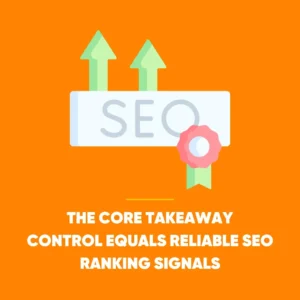SEO Ranking Signals UK Insights
The Debate Over Social Media and Search Rankings
SEO ranking signals UK debates continue over whether social media activity truly influences positions in search engine results. While many assume that the number of shares, likes, or views on platforms such as Facebook, X (formerly Twitter), or Instagram might help boost visibility in Google’s search results, the company has consistently denied it.
Recently, Gary Illyes, an Analyst at Google, reiterated this stance – and gave a clear explanation for why social media metrics will never be part of Google’s ranking signals.
Insights on SEO Ranking Signals from a Leading Google Analyst
 Gary Illyes is known in the search community for delivering straightforward answers that cut through industry speculation. Before joining Google, he was part of the web publishing world, even participating in SEO forums under the pseudonym “Methode.” This background gives him a unique perspective – he understands the needs and frustrations of SEO professionals while being deeply familiar with Google’s internal processes.
Gary Illyes is known in the search community for delivering straightforward answers that cut through industry speculation. Before joining Google, he was part of the web publishing world, even participating in SEO forums under the pseudonym “Methode.” This background gives him a unique perspective – he understands the needs and frustrations of SEO professionals while being deeply familiar with Google’s internal processes.
In a conversation with digital marketing experts from the Japanese firm Faber Company, Illyes addressed a question that comes up repeatedly: Do social media views or shares have any impact on SEO rankings?
His response was blunt:
“The answer is no. And for the future, it’s also likely no.”
Why External Signals Are Off the Table
Illyes explained that the fundamental issue is control. Google prioritises signals it can directly measure and manage. Social media data, however, comes from platforms outside Google’s ecosystem.
“We need to be able to control our own signals. And if we are looking at external signals, so for example, a social network’s signals, that’s not in our control. If someone on that social network decides to inflate the number, we don’t know if that inflation was legitimate or not, and we have no way of knowing that.”
This lack of control means that social media metrics are inherently unreliable. They can be manipulated – through bots, fake accounts, or paid engagements – making them unsuitable as a trusted input for search rankings.
The Problem with Easily Manipulated SEO Ranking Signals
Google has taken a similar stance on other SEO elements that are vulnerable to manipulation. The principle is simple: if a signal can be artificially inflated without delivering genuine value to users, it cannot be relied upon for ranking purposes.
Structured Data: Useful, But Not a Ranking Factor
Structured data is a good example. While it helps websites qualify for rich results, Google does not use it as a direct ranking factor. Misusing structured data – such as adding invisible or misleading information – violates Google’s guidelines and can result in penalties.
The Rise and Fall of LLMs.txt
Another recent case is the proposed LLMs.txt protocol, designed to control how large language models use website content. Google’s John Mueller dismissed it as unreliable, comparing it to the outdated keywords meta tag. The problem? SEO Ranking Signals relying on self-reported website data can be easily exaggerated or falsified, making them untrustworthy for rankings.
As Mueller put it:
“This is what a site-owner claims their site is about… Is the site really like that? Well, you can check it. At that point, why not just check the site directly?”
Author Bylines and Fake Expertise
Author bylines, once promoted as a way to demonstrate credibility, have also been abused. Some site owners have gone so far as to create fake author profiles and link them to fabricated social media accounts, hoping to appear more authoritative in Google’s eyes. Such tactics only reinforce Google’s reluctance to rely on unverifiable, external signals.
The Core Takeaway: Control Equals Reliable SEO Ranking Signals
 The recurring theme in Illyes’s comments is that Google’s algorithms work best when the signals they use are within the company’s control. If a signal depends on an external system prone to manipulation, it’s simply too risky to include in the ranking equation.
The recurring theme in Illyes’s comments is that Google’s algorithms work best when the signals they use are within the company’s control. If a signal depends on an external system prone to manipulation, it’s simply too risky to include in the ranking equation.
This principle applies not just to social media but to any supposed ranking factor that exists outside Google’s direct oversight.
What This Means for SEO Strategy
The takeaway for SEO professionals is clear: chasing after speculative, unconfirmed ranking factors is rarely worth the effort. Instead of banking on brand mentions, inflated social media engagement, or artificial “authority” markers, it’s more effective to invest in elements that genuinely improve a site’s performance and user experience.
Focus on User-Centred Improvements
- Content Quality – Create well-researched, engaging, and original material that genuinely answers user queries.
- Technical SEO – Ensure pages load quickly, are mobile-friendly, and meet accessibility standards.
- User Experience – Prioritise intuitive navigation, clear layouts, and engaging visual design.
- Promotion – Drive real traffic through outreach, collaborations, and marketing campaigns, rather than relying on vanity metrics.
A Call for Evidence-Based SEO Ranking Signals
As Illyes’s comments highlight, the SEO community can sometimes cling to myths – believing in ranking signals that sound plausible but lack verification. The industry’s focus should shift towards strategies that demonstrably improve visibility and user satisfaction.
Google’s position on social media metrics serves as a reminder that while external platforms can help drive traffic, their influence on search rankings is minimal to non-existent. The most reliable path to better rankings remains the same: create outstanding content, maintain technical excellence, and deliver an exceptional experience for visitors.









